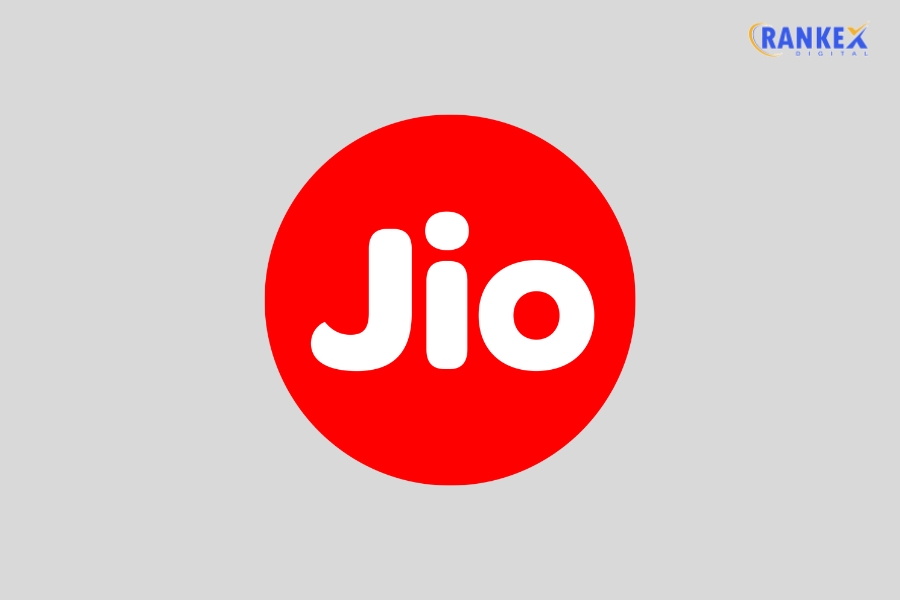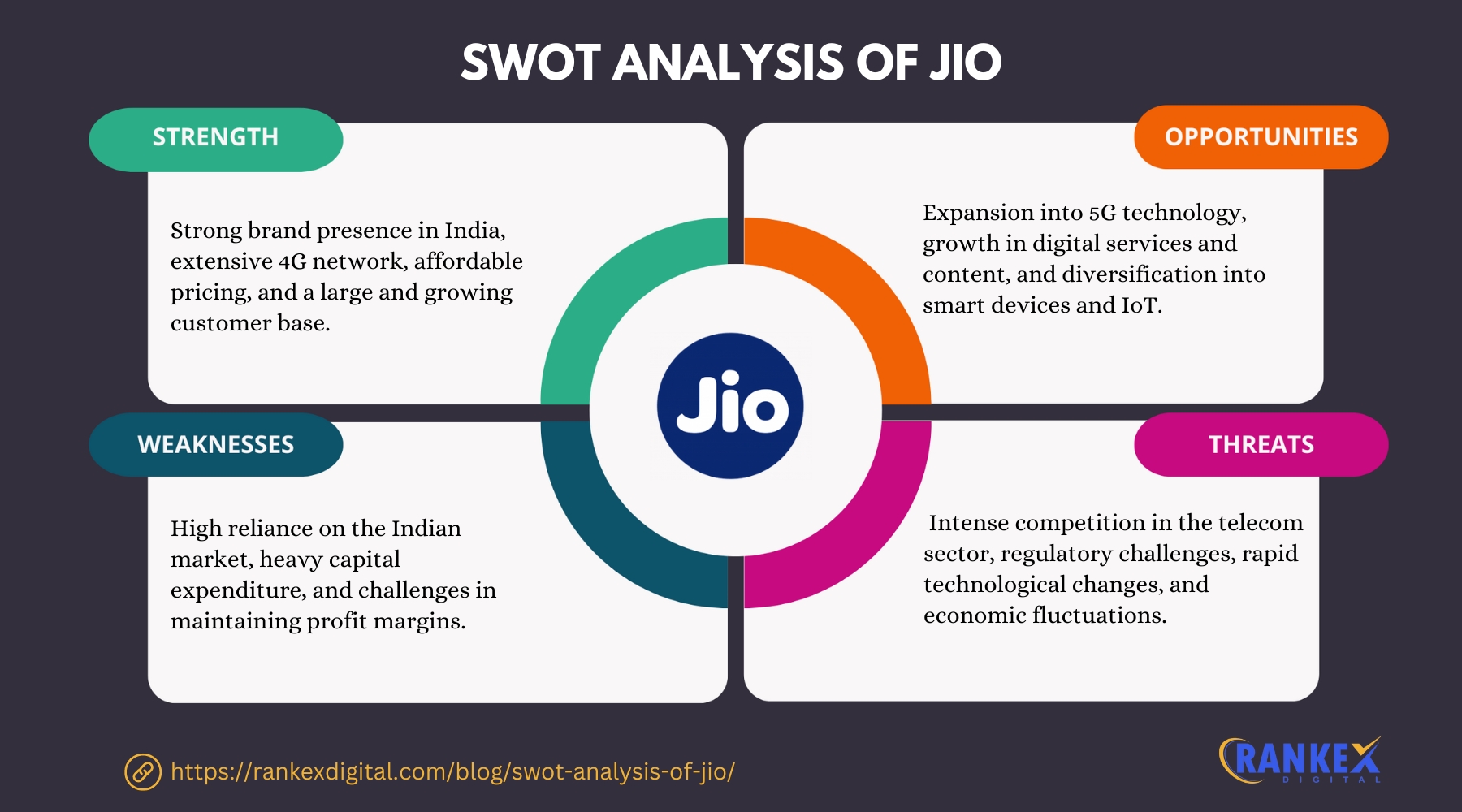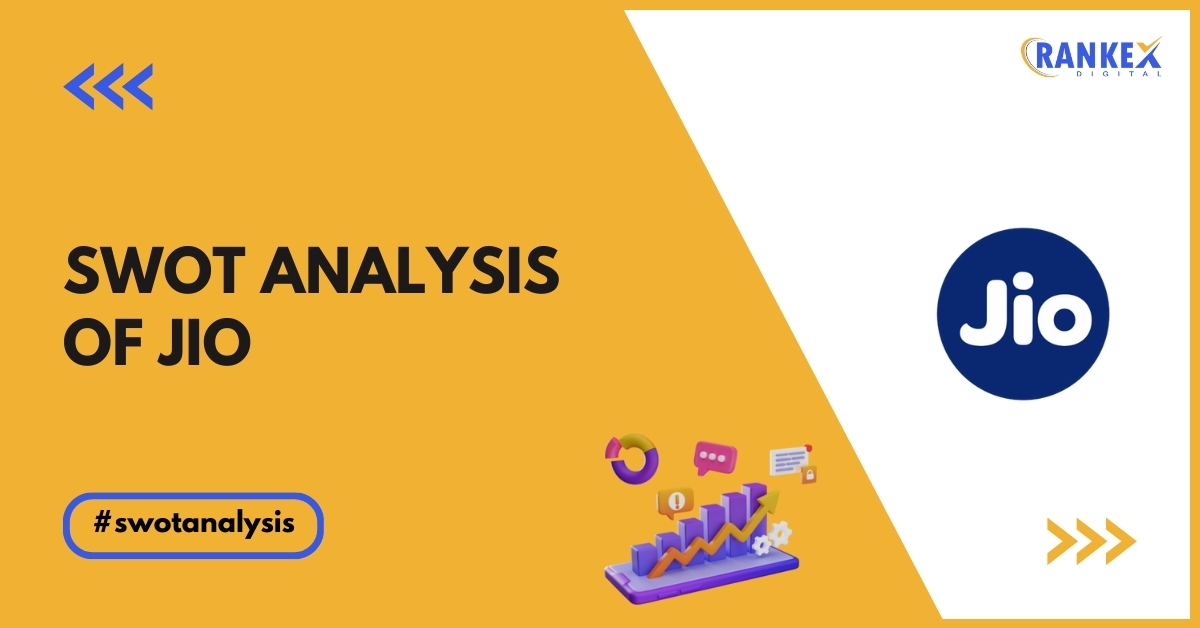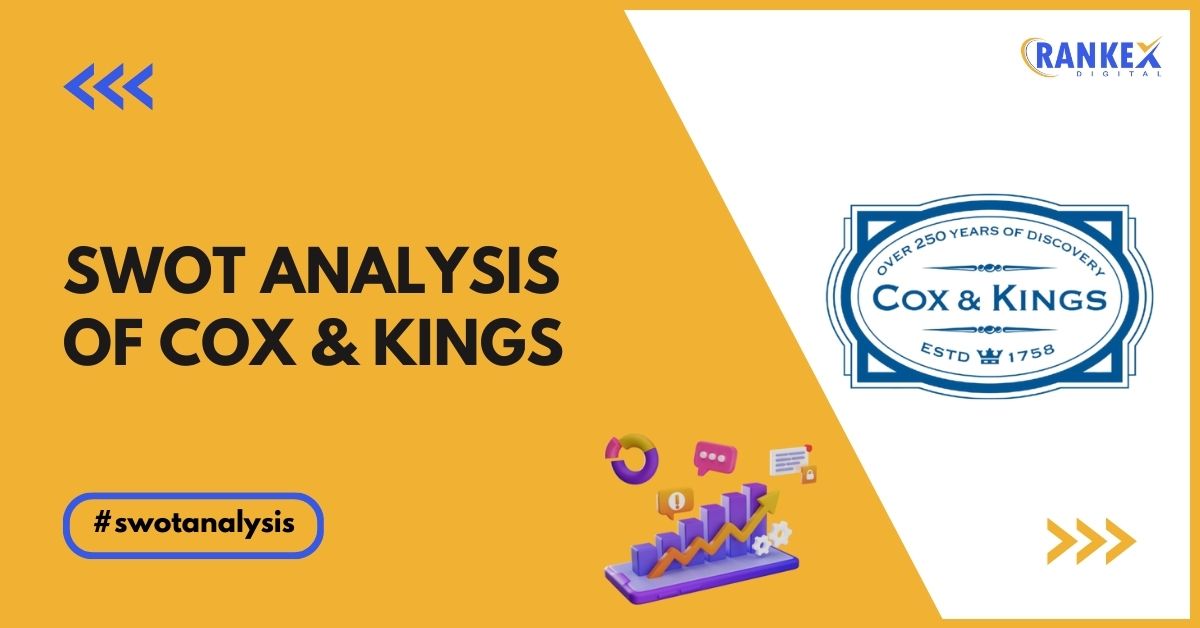Reliance Jio, a subsidiary of Reliance Industries, is one of the largest telecommunications providers in India.
Launched in 2016, Jio revolutionized the telecom sector by offering affordable 4G LTE services and has since expanded into other sectors like broadband, digital services, and content streaming.
This SWOT analysis of Jio will explore company’s current strengths, weaknesses, opportunities, and threats in 2025.
In this blog
Overview of Jio

| Founder | Mukesh Ambani (Reliance Industries) |
|---|---|
| Year Founded | 2016 |
| Headquarters | Mumbai, India |
| Industry | Telecommunications, Digital Services |
| Subscribers | 450+ million |
| Revenue | ₹98,000 crore (FY 2023) |
| Key Markets | India |
Current News on the Market on Jio
- 5G Rollout in India: Jio continues to lead India’s 5G network expansion, aiming to provide 5G services across all major cities by 2025. The company has already launched 5G in select regions and plans a nationwide rollout.
- Jio Platforms Investment: Jio Platforms, the digital arm of Jio, is expanding its portfolio through acquisitions and investments in emerging technologies, such as artificial intelligence (AI), the Internet of Things (IoT), and blockchain.
- JioCinema’s Success: Jio’s OTT platform, JioCinema, gained immense popularity by offering streaming content for free, including major sports events like the Indian Premier League (IPL). The platform is seeing increasing viewership and subscriber growth.
SWOT Analysis of Jio

Strengths of Jio
- Strong Market Presence
Jio has rapidly captured a dominant market share in the Indian telecom industry, becoming the largest telecom operator with over 450 million subscribers. Its competitive pricing strategy and innovative services make it a major player in the telecom sector. - Affordable Data and Voice Plans
Jio’s introduction of low-cost data and free voice calling disrupted the Indian telecom market, leading to a data revolution. Its affordable plans have made mobile internet accessible to millions, significantly increasing internet penetration in India. - Extensive 4G and 5G Network
Jio boasts one of the most extensive 4G networks in the country and is leading the 5G rollout. This robust infrastructure has given it a strong foothold in both urban and rural markets. - Integrated Digital Ecosystem
Beyond telecom, Jio has diversified into digital services with Jio Platforms, which include JioFiber, JioCinema, JioTV, JioSaavn, and even services like bulk SMS. This integrated ecosystem strengthens customer loyalty and opens up multiple revenue streams. - Strong Backing from Reliance Industries
Jio benefits from the financial strength and resources of its parent company, Reliance Industries. This backing enables Jio to make large investments in infrastructure, R&D, and expansion without financial constraints.
Weaknesses of Jio
- Heavy Debt Burden
Jio’s aggressive expansion strategy has resulted in significant capital expenditures, leading to a high debt load. While the company has raised funds by selling stakes in Jio Platforms, managing debt remains a challenge for long-term sustainability. - Limited Global Presence
Although Jio is a dominant player in India, its presence is limited to the domestic market. In contrast, competitors like Vodafone and Airtel have a more diversified global presence, which reduces their dependency on a single market. - Quality of Service Concerns
Jio’s rapid subscriber growth has sometimes outpaced its infrastructure capacity, leading to network congestion and slower speeds in certain areas. Maintaining high-quality service with such a large user base is a constant operational challenge. - Over-dependence on the Indian Market
Jio’s revenue is heavily reliant on the Indian market. Any major regulatory changes, economic downturns, or shifts in consumer behavior within India could significantly impact its financial performance. - Low ARPU (Average Revenue Per User)
Jio’s focus on affordability has resulted in lower ARPU compared to some of its competitors. While it has gained massive subscriber volumes, monetizing these users at higher levels remains a challenge.
Opportunities for Jio
- 5G Expansion
The nationwide rollout of 5G presents a significant growth opportunity for Jio. With its leadership in spectrum acquisition and infrastructure, Jio can capitalize on the demand for high-speed mobile data and emerging 5G applications in industries like healthcare, education, and entertainment. - Digital Transformation of India
As India continues to digitize, especially in rural and semi-urban areas, Jio is well-positioned to drive the adoption of digital services. Its initiatives in broadband, smart devices, and IoT offer substantial growth opportunities. - International Expansion
Jio could explore international markets, particularly in developing countries with large, underserved populations, similar to India. Expanding into such markets could help diversify its revenue base and reduce dependency on India. - Monetization of Jio Platforms
Jio Platforms’ growing digital services portfolio, including streaming, fintech, and e-commerce, can be further monetized through premium services, partnerships, and content deals. This opens up new revenue streams for Jio beyond telecom. - Strategic Partnerships and Acquisitions
Jio’s ability to form strategic alliances with global tech giants like Facebook, Google, and Microsoft opens up opportunities for joint ventures, innovations, and new technology implementations. These partnerships can help Jio accelerate growth and enhance its product offerings.
Threats to Jio
- Intense Competition in Telecom
Jio faces strong competition from established players like Bharti Airtel and Vodafone Idea. These companies are also investing heavily in 5G and digital services, leading to pricing pressure and reduced margins in the industry. - Regulatory Risks
The telecom sector is heavily regulated, and changes in government policies, such as spectrum pricing, license fees, or taxation, could affect Jio’s profitability. Regulatory hurdles in data protection and privacy could also impact its digital services. - Technological Disruptions
The rapid pace of technological advancements poses a constant threat to Jio’s existing infrastructure. Emerging technologies like satellite-based internet services from players like SpaceX’s Starlink could disrupt Jio’s broadband and mobile internet offerings. - Rising Costs of 5G Infrastructure
While 5G presents growth opportunities, the associated infrastructure and spectrum costs are high. If Jio cannot effectively monetize its 5G investments, it could face profitability challenges. - Economic Downturn
Any significant economic downturn in India could negatively impact consumer spending on discretionary services, including mobile data and broadband. This could lead to reduced revenues for Jio, especially in lower-income segments.
Competitors of Jio
- Bharti Airtel
Airtel is Jio’s biggest competitor in India, with a strong presence in both urban and rural areas. It competes directly with Jio in mobile, broadband, and digital services, and is aggressively rolling out 5G services. - Vodafone Idea (Vi)
Vodafone Idea is another key competitor, though it has faced financial challenges in recent years. Despite its struggles, Vi remains a player in the Indian telecom market, especially in the prepaid segment. - BSNL/MTNL
The government-owned telecom operators BSNL and MTNL are also competitors, particularly in rural and underserved regions. While they have struggled to keep up with private players, they continue to hold a significant subscriber base. - Starlink (SpaceX)
Starlink, Elon Musk’s satellite-based internet service, could be a disruptive force in the Indian broadband market. If successfully launched in India, it could challenge Jio’s dominance in remote and rural areas where traditional broadband infrastructure is difficult to build. - Google Fiber (Potential)
As Google ramps up its internet services worldwide, it could potentially challenge Jio in India’s broadband market, particularly in urban centres where the demand for high-speed internet is increasing rapidly.
Conclusion
Reliance Jio has reshaped India’s telecom and digital services landscape through its affordable pricing, extensive network, and innovative ecosystem.
As the company prepares for the next phase of growth with its 5G rollout, it must continue to manage its debt, improve service quality, and leverage its digital platform for increased monetization.
While Jio faces competitive and regulatory challenges, its strong market position, deep pockets, and expansion into emerging technologies give it a robust platform to drive future growth.
Frequently Asked Questions
1. What are Jio’s strengths?
Jio’s strengths include its large market presence, affordable data plans, extensive 4G and 5G network, integrated digital ecosystem, and strong backing from Reliance Industries.
2. What are Jio’s weaknesses?
Jio’s weaknesses include its heavy debt burden, limited global presence, occasional service quality issues, over-dependence on the Indian market, and low ARPU.
3. What opportunities does Jio have in the future?
Opportunities for Jio include expanding its 5G services, capitalizing on India’s digital transformation, exploring international markets, monetizing its digital services, and forming strategic partnerships.











